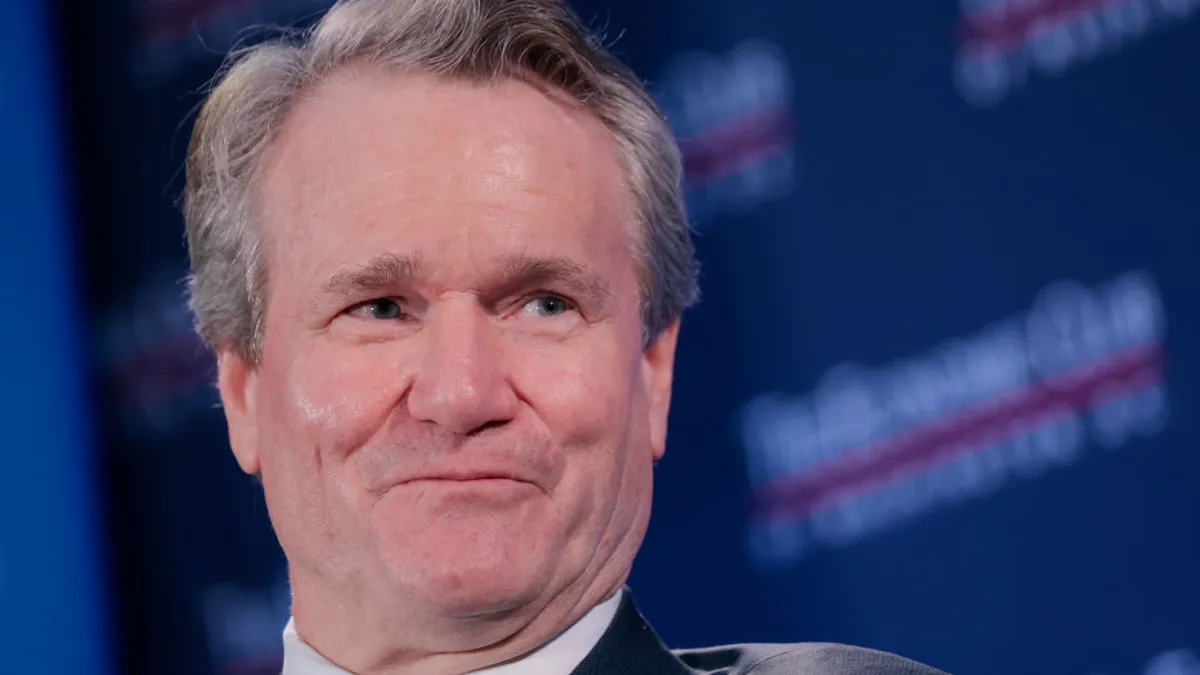About a month after President Donald Trump accused Bank of America and other big banks of political de-banking, BofA CEO Brian Moynihan offered more of a response Tuesday, blaming regulation.
Interviewing Moynihan during an event at The Economic Club in Washington, D.C., David Rubenstein, the nonprofit’s chairman who’s also co-founder and co-chair of the Carlyle Group, wasted no time asking the bank CEO on Tuesday for his response to Trump’s jab.
The president made the accusation during his virtual appearance at the World Economic Forum in Davos, Switzerland, last month, asserting “many conservatives complain that the banks are not allowing them to do business ... and that included a place called Bank of America.”
“We bank everybody,” Moynihan said Tuesday. “But the real question was about over-regulation, frankly.”
Moynihan pointed to interpretations of anti-money laundering, Bank Secrecy Act and know-your-customer regulations, saying “there’s a lot of burden on the banking system” to report suspicious activity and analyze it.
Bank of America sometimes has “to close accounts and we can’t tell people why we did it,” which can create confusion, Moynihan said.
He noted de-banking has been an issue in the cryptocurrency realm, “where the regulators said you can’t bank crypto operating companies, employees of crypto companies, etc.,” Moynihan said. “The operating company, they said, ‘That’s a high-risk activity, ask us for authority.’ And guess what? You would have never gotten the authority.”
The issue was the focus of a recent Senate Banking Committee hearing, in which lawmakers and witnesses agreed de-banking is an issue, but debated whether bank regulation or the lenders themselves are to blame.
Ultimately, Trump’s rebuke “opens the dialogue about how to get these regulations correct,” Moynihan said. One potential reform, he mentioned later, would be raising BSA reporting requirements for cash transactions, from the current $10,000 threshold.
Earlier this month, during an investor conference appearance, Moynihan indicated he wants balance and “the right regulation.” The banking industry broadly sees Trump’s presidency ushering in an era of lighter regulation and a more business-friendly environment.
“Give us a rational regulatory structure, and have it stick to the ribs,” Moynihan said Tuesday. If the pendulum keeps swinging hard in either direction following an election, clients can’t depend on the bank, he contended.
He also suggested consolidation of bank regulatory agencies may be warranted.
“The spaghetti chart of overlap is the question,” Moynihan said, ticking off the various federal regulators that oversee the industry. Regulatory consolidation “is probably more appropriate today than it was when you had 10,000, 15,000 banks,” he said.
Rubenstein also brought up the recent backlash against diversity, equity and inclusion initiatives, which some big banks have sought to distance themselves from amid the Trump administration’s crackdown on DEI. Rubenstein asked Moynihan if the bank has a DEI policy, “or not anymore?”
Moynihan didn’t answer that question directly. “We have diversity and inclusion at our company,” he responded. “But, step back: we’ve always been the bank of opportunity.”
JPMorgan Chase, Citi, Morgan Stanley, Capital One and U.S. Bank are among those that have de-emphasized mentions of DEI in their annual regulatory filings, or have decided to scrap DEI-related goals, requirements or programs.
Moynihan mentioned various diversity- and inclusion-focused programs the Charlotte, North Carolina-based bank has, including one that’s geared toward hiring low- to moderate-income individuals.
“We have a diverse team, we stress inclusion, so when you’re at our company, you can be who you want to be and be successful,” he said.
Another area of focus for the Trump administration is advancing digital assets.
“It’s pretty clear there’s going to be a stablecoin,” Moynihan said. “If they make that legal, we will go into that business ... The question of what it’s useful for is going to be interesting.”














